Timeline of Adelphi University’s History
Learn about some of the important milestones of Adelphi University.
1863
Adelphi can trace its roots to Adelphi Academy (founded in 1863), a private preparatory school located at 412 Adelphi Street, Brooklyn.
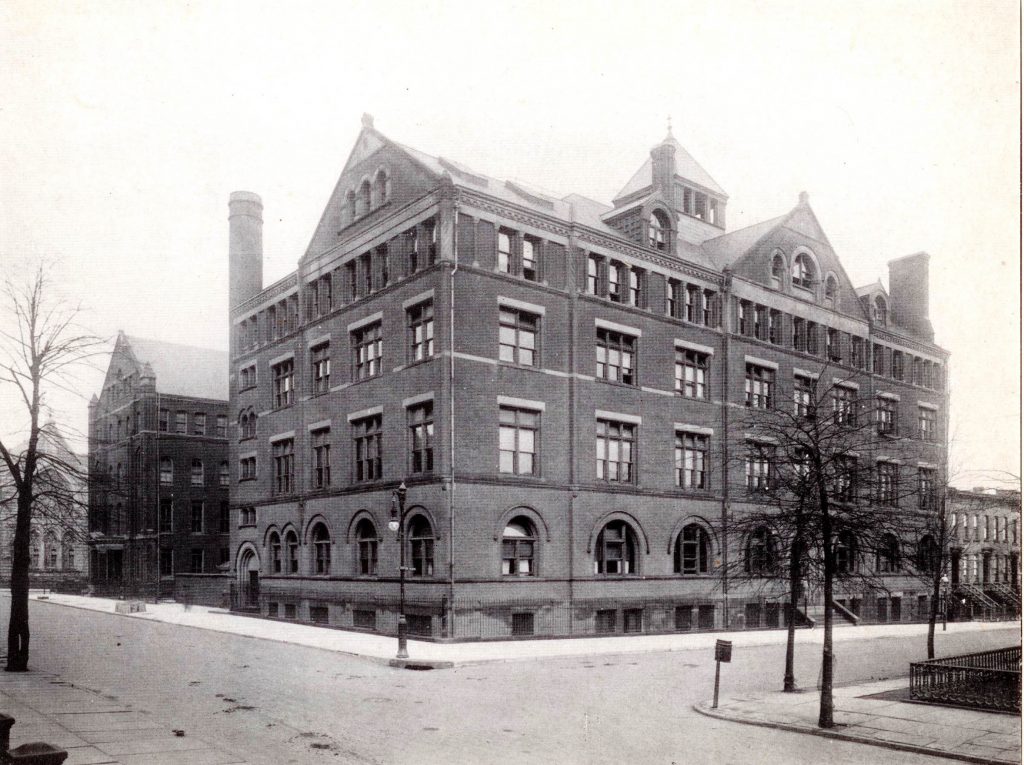
Adelphi University was the first private, coeducational university on Long Island, opening the doors at its original Brooklyn location in 1863 as the Adelphi Academy.
1893
Charles H. Levermore becomes the Principal of Adelphi Academy, a private preparatory school located at 412 Adelphi Avenue in Brooklyn, New York. Levermore’s goal is to expand the academy, known for its innovative curriculum, into a four-year, coeducational liberal arts college.
1894
Timothy L. Woodruff becomes President of the Board of Trustees of Adelphi Academy and petitions the Board of Regents of the State of New York to establish a liberal arts college in the city of Brooklyn. Woodruff would later serve three terms as the Lieutenant Governor for the State of New York.
1896
Through the efforts of Dr. Charles H. Levermore and Timothy Woodruff the Charter for Adelphi College is granted on June 24, 1896—one of the earliest granted to a coeducational college by the Board of Regents. Dr. Charles Levermore becomes the first president of Adelphi College, and Woodruff, a former Lieutenant Governor of New York State, served as president of the Board of Trustees.
Classes begin in September with 57 students and 16 instructors.
1908
Timothy L. Woodruff steps down as president of the board of trustees, but remains a member until 1913. James H. Post, philanthropist and sugar magnate, succeeds him.
1912
Adelphi had been known since its inception as a premier school for women. In 1912, the Board votes to make Adelphi a college exclusively for women.
1915
Frank D. Blodgett receives unanimous Board approval to become the second president of Adelphi, succeeding Charles H. Levermore.
1922
Faced with increasing enrollment, Adelphi seeks to raise $1 million to expand the facilities.
1925
The College severs all financial and academic ties with Adelphi Academy. The monogram in the school seal is changed from “AA” to “AC” and the founding date is changed from 1869 to 1896.

1928
Enrollment surges. 652 students are attending classes in a building designed to accommodate 560 students. Looking ahead to the future, President Blodgett and a committee of trustees search for a new site for the college. The committee selects 68 acres in Garden City, Long Island. On October 8, 1928, the cornerstone of the first new college building is laid.

Adelphi University 1928 groundbreaking, Garden City NY.
1929
Classes begin on Monday, September 30 on Adelphi’s new Garden City campus in three buildings designed by the renowned architectural firm of McKim, Mead & White.
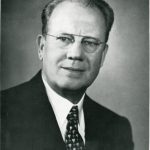
Paul Dawson Eddy
1937
In the midst of the Depression, Adelphi is forced into receivership. A new president, Paul Dawson Eddy is faced with the task of saving the College. He redesigns the curriculum to include practical and vocational skills, adds prominent Long Island businessmen to the Board of Trustees and reduces the size of the faculty. Eddy’s strategy of meeting the demands of the community will dominate Adelphi’s development for the next half century.
1938
Internationally renowned choreographer and dancer Ruth St. Denis becomes the head of one of the first dance departments at an American university. It has since become a cornerstone of the Department of Performing Arts.
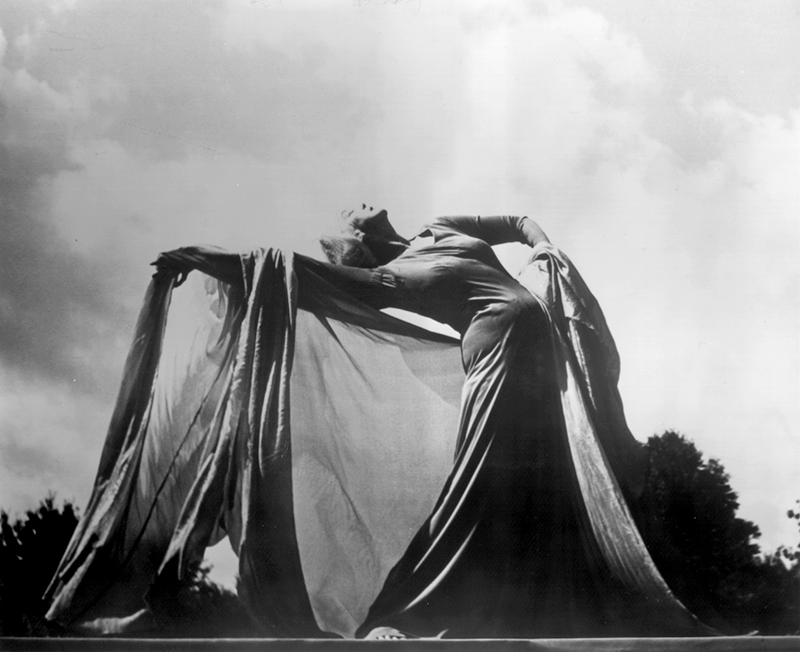
Modern dance pioneer Ruth St. Denis founded Adelphi’s dance department in 1938.
1943
Under the direction of Mildred Montag, Adelphi establishes the first Central Collegiate School of Nursing and the U.S. Cadet Nurse Corps in New York State. Created in response to the need for nurses after the United States’ entry into World War II, the Nursing School extends Adelphi leadership in professional education.
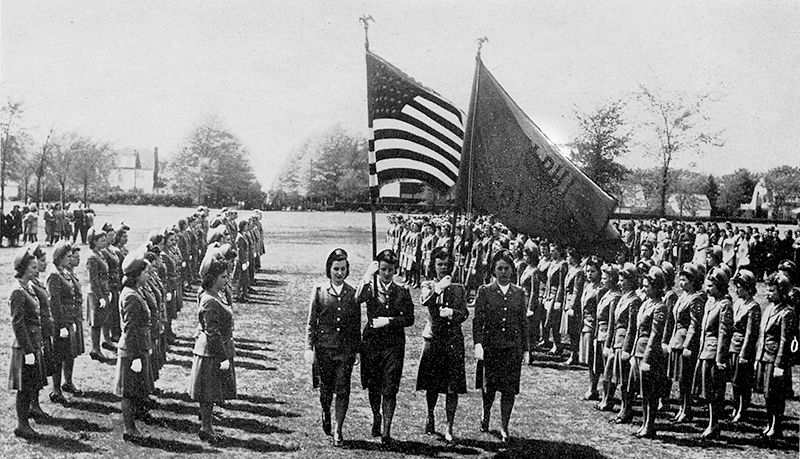
U.S. Cadet Nurse Corps marching at Adelphi.
1944
First Lady Eleanor Roosevelt dedicates Harvey and Alumnae, two new dormitories financed by the Federal Works Agency needed to house the increasing number of nursing students.
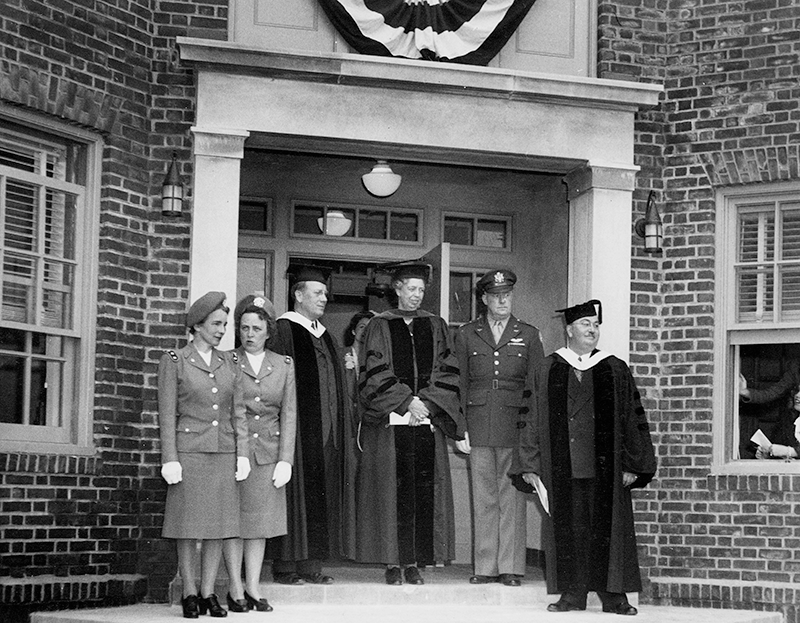
Eleanor Roosevelt speaks at Adelphi on May 6, 1944.
1946
After the end of World War II, Adelphi again opens it doors to men, giving an opportunity to the many veterans seeking to further their education under the GI Bill.
1947
The post-war period is marked by expansion into new areas relating to business. The admission of men spurs the creation of basketball, football, swimming, wrestling, baseball, and track teams.
1949
Adelphi’s School of Social Work is founded.
1952
Adelphi’s program in clinical psychology is formally organized.
1955
The College marks its 60th anniversary with a three-day series of lectures and cultural events.
Enrollment hits 3,667.
A Ford Foundation grant for $407,000 supports increasing faculty salaries.
1957
On June 1, Adelphi hosted the first National Wheelchair Games with team and individual events including javelin throwing, table tennis, wheelchair basketball, and archery.
1963
Adelphi is granted university status by the Board of Regents of the State of New York.
The Leon A. Swirbul Library opens, named for Adelphi trustee and Grumman Corporation founder.
The faculty grows to 209, and the campus expands from the original three buildings to 16 on 70 acres of land.
1964
The Board of Regents establishes the School of Business Administration (now the School of Business) as a distinct unit, conferring baccalaureate and master’s degrees.
1965
Arthur Brown named president of Adelphi following Paul Dawson Eddy’s retirement.
The Graduate School of Arts and Sciences is established.
1966
The Institute for Advanced Psychological Studies (since rededicated as the Gordon F. Derner School of Psychology) becomes the world’s first university-based professional program in clinical psychology.
1967
Robert Olmsted, a member of the board of trustees, is appointed interim president.
1969
Charles Vevier is appointed president.
1971
Trustee Randall McIntyre becomes acting president.
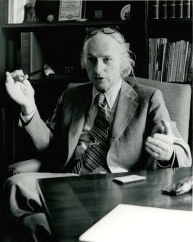
Timothy Costello
1972
Timothy Costello is named president of Adelphi.
The Ruth S. Harley University Center is dedicated. Harley’s association with Adelphi would span over eight decades as a student, professor, Registrar, and Dean of Women (later Dean of Students), a post she held from 1942 to 1970, and distinguished alumna. Following her retirement in 1970, she was appointed Dean Emeritus, a scholarship fund and student center were named in her honor, and the Ruth Stratton Harley Distinguished Alumni Achievement Award was established in 2004. She died July 4, 2005 at the age of 103.
Adelphi’s Gordon F. Derner Institute of Advanced Psychological Studies became the nation’s first university-based professional school of psychology. Since then, the Derner School of Psychology has emerged as an internationally recognized leader in scientific and clinical psychology.
1973
Adelphi establishes ABLE (Adult Baccalaureate Learning Experience), one of the earliest adult education baccalaureate programs.
Adelphi’s School of Social Work opens a satellite program in Poughkeepsie, New York.
1979
President Tim Costello establishes an Honors Program in Liberal Studies.
Adelphi University’s Learning Resource Program is established. This program provides services to students who have learning disabilities and was one of the first of its kind nationwide.
1980
The Adelphi New York Statewide Breast Cancer Hotline and Support Program is established.
1984
The Institute for Teaching and Education Studies is created.
1985
Peter Diamandopoulos is selected as president.
1990
The University establishes a core curriculum, an interdisciplinary approach to general education. Required courses are taken throughout the four-year course of study to provide the context in which knowledge advances understanding.
The Institute for Teaching and Education Studies is reorganized as the School of Education.
1993
The Society of Mentors is established to provide every freshman and sophomore with a distinguished faculty adviser to enhance their University experience and guide them beyond the requirements of the curriculum.
1995
The Honors College is established to educate American leaders. The rigorous course of study includes small classes, a specially selected faculty, and co-curricular and extracurricular activities.
1999
Steven L. Isenberg is named interim president.
2000
Dr. Robert Allyn Scott is inaugurated as Adelphi’s ninth President. He is one of the few people ever to hold all three top positions in higher education: head of an independent university, a public institution, and a state higher education coordinating board.
Adelphi celebrates 25 years of Performing Arts in the Olmsted Theatre.
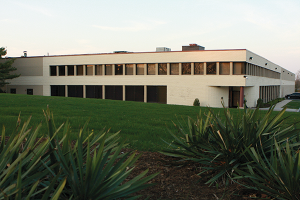
Adelphi University Hauppauge Center
2002
Adelphi’s Hauppauge Center opens in Suffolk County.
A ceremonial groundbreaking for a new residence hall is held.
Adelphi joins the American Association of Botanical Gardens and Arboreta and its 75-acre Garden City campus is designated the Arboretum at Adelphi.
2003
The building that houses Adelphi’s School of Business is dedicated as the Hagedorn Hall of Enterprise.
Adelphi honors Mildred Montag and the 60th anniversary of its School of Nursing.
The Honors College celebrates 25 years at Adelphi.
The United Nations Committee on Non-Governmental Organizations of the Department of Public Information approved Adelphi as a non-governmental organization in recognition of the University’s commitment to bringing “global awareness of international issues and the United Nations to the University community and the public.”
2004
Adelphi celebrates its 75th anniversary in Garden City.
University Professor of Music Paul Moravec is awarded the 2004 Pulitzer Prize for Music.
The Women’s Lacrosse team wins the National Collegiate Athletic Association (NCAA) Division II Championship, the first national title for a women’s program at Adelphi.
Women’s Soccer advances to the NCAA Championship Game for the first time since 1992. The Panthers finish as National Runners-up.
Adelphi Men’s Soccer turns 50.
2005
The visual arts at Adelphi are given a new home, with the construction of a new state-of-the-art Fine Arts and Facilities Building, later named the Adele and Herbert J. Klapper Center for Fine Arts.
Swirbul Library gets a makeover, thanks to an extensive interior renovation.
A $1 million gift from Amy and Horace Hagedorn paves the way for Adelphi’s new Early Learning Center.
Adelphi celebrates 30 years of women’s athletics.
Adelphi receives the “Leadership in Higher Education” award from Long Island Works Coalition.
President Robert A. Scott is named one of Long Island’s 100 most influential Long Islanders by Long Island Business News.
2006
The School of Education is named in honor of alumna Ruth S. Ammon ’42, mother of Carol A. Ammon M.B.A. ’79, Adelphi Trustee and benefactor.
Adelphi University receives a $5 million grant from New York State, the largest public grant in its 110-year history, to help fund the construction of the new Performing Arts Center.
Senator Hillary Rodham Clinton delivers the University’s 110th Commencement address at Nassau Coliseum.
Adelphi is recognized as a “Best Buy” in the Fiske Guide to Colleges.
New multiple-building instructional, performing arts, and sports complexes, slated for 2008-2009 completion, will enhance Adelphi’s academic, artistic, athletic, and recreational programs.
Adelphi becomes the only university on Long Island, and one of a handful in New York State, to offer a Ph.D. in nursing.
New York Times reporter Bruce Lambert chronicles Adelphi’s recent success in an article in the Metro Section.
Women’s Lacrosse repeats as NCAA Division II National Champions.
Women’s Soccer celebrates 25 Years at Adelphi.
Adelphi University created the Levermore Global Scholars Program to emphasize international learning as a crucial facet of an Adelphi undergraduate education. The undergraduate program, named for Adelphi founder Charles Levermore, centers on global learning and international studies.
2007
The Ruth S. Ammon School of Education is awarded National Accreditation by National Council for Accreditation of Teacher Education (NCATE), the premier accrediting body in the field.
Adelphi’s School of Business earns accreditation by AACSB International—The Association to Advance Collegiate Schools of Business, the longest serving and largest global accrediting body for business schools that offer undergraduate, master’s, and doctoral degrees in business and accounting.
2008
Three new state-of-the art buildings open: the Performing Arts Center (PAC), the Center for Recreation and Sports and the Alice Brown Early Learning Center. Woodruff Hall renovations are completed and Motamed Field opens.
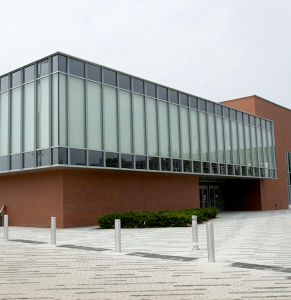
Performing Arts Center
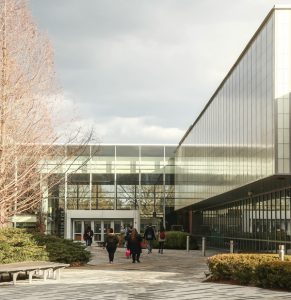
Center for Recreation and Sports
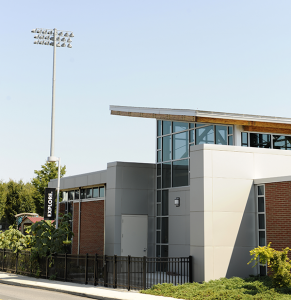
Alice Brown Early Learning Center
2012
Adelphi University School of Business is named after $9.5 million donor and board chairman Robert B. Willumstad ’05 (Hon.).
2013
The School of Nursing became the College of Nursing and Public Health.
2015
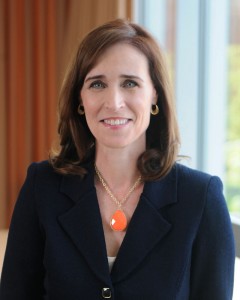
Christine M. Riordan, Ph.D.
Christine M. Riordan, Ph.D., became Adelphi’s 10th President on July 1, 2015. President Riordan is an internationally recognized expert in leadership development, diversity and inclusion, and team performance. Prior to beginning her Adelphi appointment in July 2015, Dr. Riordan served as provost of the University of Kentucky, which has more than 30,000 students, 19,000 full- and part-time employees and a budget of $3 billion.
Construction begins on the new Nexus Building.
2016
The Nexus Building opens for the Fall 2016 semester.
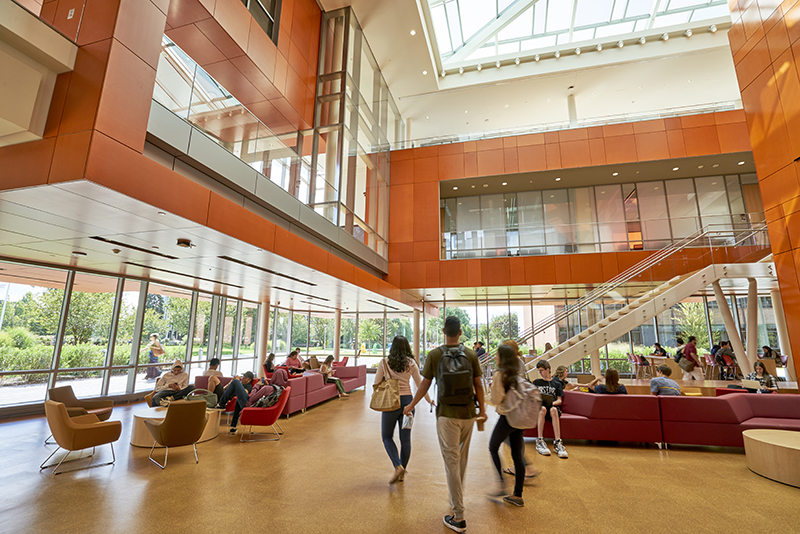
A view of the lobby of Adelphi University’s Nexus Building.
2017
The Gordon F. Derner Institute of Advanced Psychological Studies is renamed as the Gordon F. Derner School of Psychology.
University College is renamed as the College of Professional and Continuing Studies.
2018
Adelphi welcomes the largest first-year class in its history after enrolling classes of record-setting size in each of the previous two years.
2019
The Ruth S. Ammon School of Education was reorganized to become the College of Education and Health Sciences, with the Ammon School now under its umbrella.
2020
The Adelphi Innovation Center opens , providing students and faculty opportunities to work collaboratively to solve challenges facing local corporations and organizations.
The Association of American Colleges and Universities selects Adelphi as one of only 13 institutions to host a Truth, Racial Healing and Transformation Campus Center.
Adelphi wins the 2020 John L. Blackburn Exemplary Models Award from the American Association of University Administrators for our innovative Prep for Success program.
The COVID-19 pandemic forces Adelphi to transition to remote learning in March. Campus successfully reopens in September, guided by protocols developed by the University’s Restart, Recover, Reimagine Initiative.
Adelphi receives $4.7 million bequest from nursing alumna Betty L. Forest ’47, PhD ’10 (Hon.) to endow the Dr. Betty L. Forest deanship of the College of Nursing and Public Health and to support scholarships and innovation at the College.
2021
The renovated Ruth S. Harley University Center reopens after two-year construction project creating a beautiful, environmentally friendly, state-of-the-art hub of campus life.
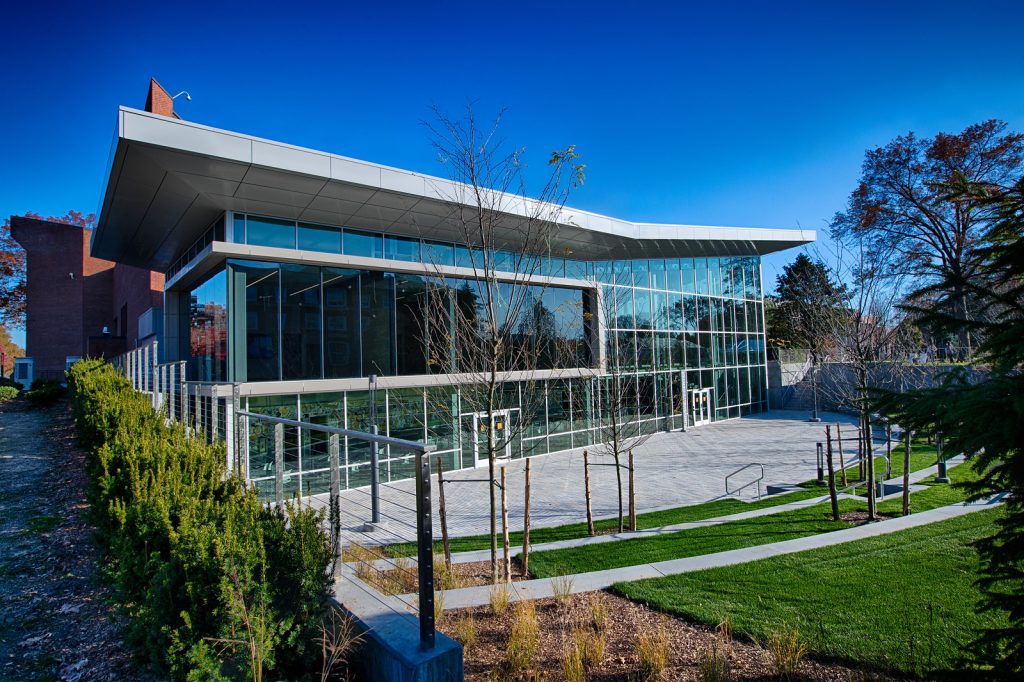
Despite the challenges of construction during a global pandemic, the new University Center (UC) is complete—and opens its doors to the community on January 18, 2021.
Adelphi celebrates its 125th Anniversary.